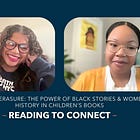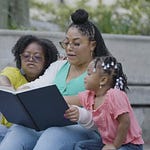The write-up below is a direct repeat of the podcast audio for those who prefer to read. Whether you choose to listen or read, the content is the same—so go with what works best for you!
Hey, Hey!
We’re riding to school, taking the long way this morning. We don’t usually, but today we stopped for breakfast. It’s 7:20 a.m.—our usual time, even though school opens right as we pull up.
Devices are nowhere in sight. That’s how we like it. When we’re in the car, it’s our time. We’re either talking or sharing music—edited Kendrick, Imagine Dragons, or lately, a lot of Japanese songs. Our rides feel sacred. Always have. We’ll even take rides just to take them, exploring new streets, new places—because there’s something beautiful about seeing the world together.
And this morning, I decide to see what Aidyn thinks about something I’ve been watching unfold—Trump’s push to get rid of the Department of Education.
I know most adults don’t fully understand what that would mean—how it’s about so much more than schools. But I’m curious about what he knows, what he thinks. With Aidyn, I’ve learned not to be surprised when he stops me in my tracks. I’ve learned to dig deeper—to ask, “What do you mean by that?”—because there’s always more beneath the surface.
The conversation widens, as it always does. We start talking about rights—Native rights, Black rights, LGBTQ rights—and what happens when power is used to strip people of their humanity.
I tell him, “No matter how you feel about someone’s choices, or the skin they were born into, we are all human. And human rights? They aren’t something you get to take away.”
And then he says it—
“What does he think America is? His playbox? All he’s doing is building up sandcastles.”
I pause. “Sandcastles?” I ask. “Why sandcastles?”
“Because they don’t last,” he says. “Why build all these things that won’t last?”
Out of the mouth of a 10-year-old. Simple. Sharp. True.
And he’s right. Sandcastles are built for the moment. We don’t build them to last. We don’t worry about what happens after we walk away. The tide will come. The wind will shift. The playground sand will be leveled again. And that’s the whole point—sandcastles aren’t meant for anyone but the builder. They aren’t meant to stand. They aren’t meant to shelter. They aren’t meant to serve.
That’s the kind of power he’s describing—the kind built for ego, not for people.
And it hits me: He’s seen this cycle before. In history. In books. In stories where kings build high towers and walls meant to keep people out. Where villains hoard gold they’ll never spend. Where power built on greed always crumbles when the tide of truth comes in.
Because this is what reading together does. It teaches more than literacy—it teaches legacy. It shapes how we see the world, how we question it, and how we imagine something better.
I’ve been reading to Aidyn since before he was born. And now, at almost 11 years old, he still reminds me if I forget to read to him. He still loves picture books—because to him, story is story. Right now, we’re reading through the Bible, one section a night. And just like every book before, it’s giving him language for the world and a lens to see through.
Books help us make sense of the world together. They show us what power looks like—through the ruler who taxes unfairly, through the bully at school, through the troll under the bridge demanding a toll just because he can. They show us what justice looks like—through the hero who stands up, through the friend who steps in, through the moment someone says, “Enough.”
This is why I don’t shy away from the hard conversations. I can’t afford to. Not raising a Black son in a world that has built fear around his very existence.
Some people say kids are too young to talk about politics, justice, or race. But I’ve seen what happens when you wait too long. Black boys don’t get the luxury of growing up slow. The world turns them into men before they’re ready. And just like my father told me about driving—“You’re not driving for you, you’re driving for everyone else on the road”—I tell Aidyn that when he walks through this world, he’s walking with God. And he has to know that how the world sees him isn’t about his worth—his worth is already defined and cannot be taken away. For those that approach with anything less than the joy of who you are, it's not about you—it’s about their fear.
But here’s the thing: I don’t want him to walk this world in fear—I want him to walk it in truth. With the wisdom that comes from knowing stories—his own and others’. I want him to understand power—not just how it’s taken, but how it’s built. And most of all, I want him to know that the strongest castles aren’t made of sand—but of justice, courage, and love.
And so, we read. Because books don’t just make readers—they make thinkers. They make builders. They make children who see sandcastles for what they are—
—and choose to build something that lasts.
Where Do We Go From Here?
If you’ve been waiting to have the ‘hard conversations’—about justice, about power, about humanity—know this: Your child is ready to listen. The question is, are you ready to lead them through it?
Stories are the door. Books are the bridge. And it’s in those conversations—during bedtime reads, car rides, and “just one more chapter” moments—that legacies are built.
If you’re not sure where to start, start here:
Explore the builders. Deepa Iyer’s We Are the Builders reminds us that we all have a role in building a just world—and it’s a book you can share with your child.
Know your story. In our conversation with Rio Cortez (The ABCs of Black History), she reminded us that knowing and sharing our stories with our children isn’t optional—it’s essential.
Create a reading legacy. And if you want a roadmap to connect deeply with your child through books—and through conversation—start with the ENGAGE Method. It’s designed for families who want to use books not just to read, but to reach their children. Learn more at readingtoconnect.com/engage.
The strongest castles are the ones you build together.
So, what will you build with your child today?
My best,
Quinn 📚💕















Share this post